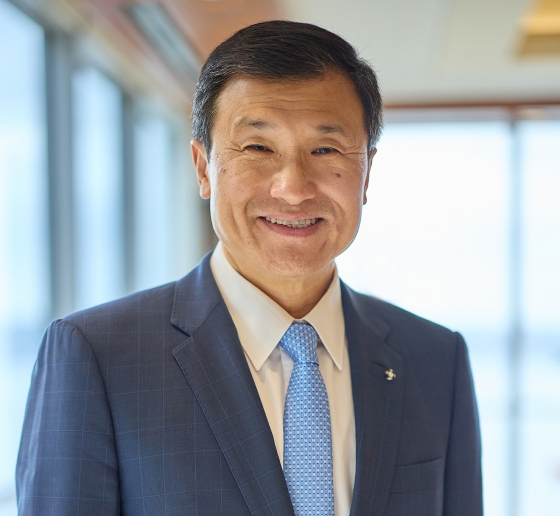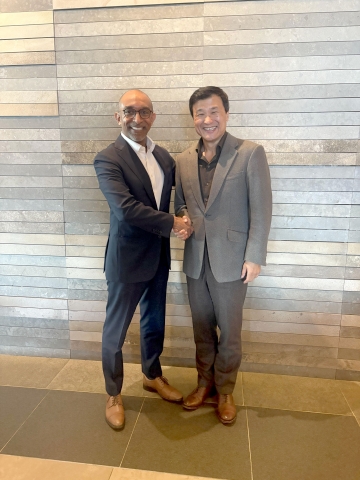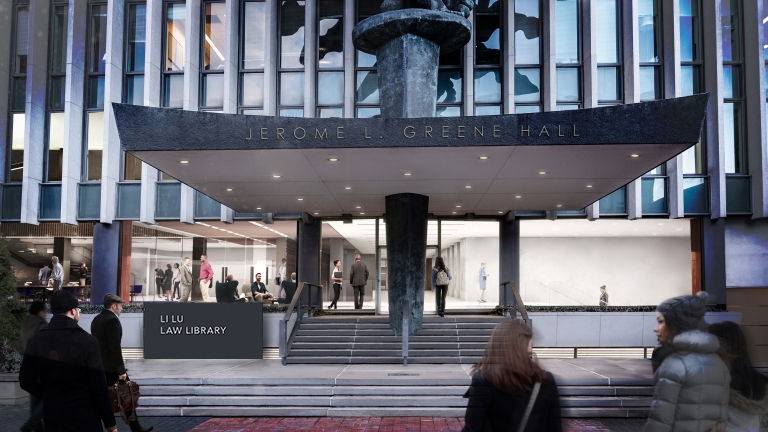A Transformative Gift for a Transformative Project: $15 Million From Li Lu ’96 Supports Law Library Renovation
In recognition of his extraordinarily generous gift—no individual has made a larger single gift in the Law School’s history—the new space will bear Li Lu’s name.

The multiyear project to fully reimagine Columbia Law School’s library took a momentous step forward thanks to a lead gift of $15 million from Li Lu LAW ’96, BUS ’96, CC ’96. In honor of his exceptional level of support, the new space will be known as the Li Lu Law Library.
Born in China, Li Lu grew up during the Cultural Revolution and was a prominent student activist who helped lead the Tiananmen Square protests in 1989. Soon after, he was invited to speak about his experiences at Columbia, where he later enrolled. He went on to become the first Columbia University student to earn three degrees simultaneously. In reflecting on his time at the Law School, he says, “Columbia has been foundational to my life. … When I came to the U.S. in 1989 as a refugee, it was this university that gave me an emotional and intellectual home and provided an enormous opportunity that I could not imagine before I arrived here.”
In spring 2025, Daniel Abebe, Dean and Lucy G. Moses Professor of Law, invited Li Lu to tour the new library and talk further about the Law School’s future. At the height of construction, the site was still a vast maze of exposed steel framework, wiring, and columns. But what Li Lu saw and heard from the Dean left a meaningful impression. “My time at Columbia reinforced for me that a library is never just a building or collection. Rather, it is the intellectual heart of a university. When I first met with Dean Abebe last fall and learned about his ambitious vision for the Law School, I was deeply inspired,” he says. “As our conversations continued, I felt I had the opportunity with the Law Library to enable something transformative—a space that aligns with how legal scholarship and learning are evolving. … I believe great institutions must continually renew themselves. This gift is my way of helping Columbia Law School remain at the forefront of legal education here in the U.S. and around the world.”

Scheduled to open later this fall, the new library will serve as the Law School’s signature space for learning, collaborating, and community building. “The Li Lu Law Library will be a vibrant hub of intellectual activity and interpersonal connection,” says Dean Abebe. “Li Lu’s gift is an unprecedented investment in the student experience and ensures that Columbia Law School will continue to attract the most talented students and scholars, providing them with unparalleled resources for success. I am enormously grateful to Li Lu for his incredible generosity and unwavering commitment to the Law School.”
One of the most significant capital projects in Columbia Law’s history, the Li Lu Law Library will advance the Law School’s plans to enrich student and community life. “The library sits at the intersection of tradition and innovation,” says Li Lu. “The law is an ancient and foundational discipline to our society, but legal education and scholarship are rapidly changing. Students and scholars need tools and spaces that keep pace.”
Li Lu was particularly impressed by the scope of the project and flexibility of the space. The Li Lu Law Library encompasses 50,000 square feet, spread over three floors of Jerome L. Greene Hall. The open, light-filled design by leading architectural firm Perkins Eastman features views across Revson and Ancell plazas, a striking two-story reading room, and more than 600 study seats (an increase of 60% from the prerenovation layout). Reservable group study rooms of various sizes, complete with state-of-the-art technology, are adaptable to the evolving needs of Law School students.
“Ideas do not live solely in bits and bytes,” Li Lu says. “A library embodies history, provenance, and a tangible connection to the intellectual journey. … Even digitally native scholars benefit from a sanctuary—a place apart from distractions, optimized for mindful work.”
Li Lu also believes the newly renovated library will succeed in its goals to build community and inspire a true sense of belonging. “Everyone who visits should feel that this is their space—regardless of background—where they are empowered to explore, ask hard questions, and create new scholarship,” he says. “I want it to be a place where students are energized by connection with each other: bumping into others, overhearing ideas, collaborating across fields. And finally, pride. Columbia Law School students should understand that they are part of a legal institution that aspires to excellence and innovation.”

Li Lu’s ties to Columbia run deep: He served as a member of the Board of Trustees of Columbia University from 2017 to 2024; he also received the John Jay Award from Columbia College in 2012 and the Distinguished Leadership Award from Columbia Business School in 2025. Among his many accomplishments, Li Lu founded global value-investing firm Himalaya Capital, where he serves as chairman and manages its principal fund. He is the author of Civilization, Modernization, Value Investing, and China and Moving the Mountain: My Life in China, an elected fellow of the American Academy of Arts & Sciences, and the recipient of numerous accolades, including the Henry Crown Leadership Award from the Aspen Institute. He is co-founder and inaugural board chair of The Asian American Foundation, which serves the Asian American and Pacific Islander community in the pursuit of belonging and prosperity, free from discrimination, slander, and violence.
Having the Law Library bear his name will, he hopes, resonate with people, including those who may find inspiration from his own story. “It means a great deal to me that Asian American students might feel proud seeing an Asian name so visibly tied to the Law School, reflecting the diversity that makes this place special,” he says.
Now, with the Li Lu Law Library, he is nurturing and empowering Columbia Law graduates of tomorrow. “I hope this library becomes a symbol, a gathering point, a platform for Columbia to lead in legal thinking for years to come,” he says. “I care about Columbia’s long-term trajectory—preserving and enhancing its capacity for excellence. It feels like a natural way to help future generations by giving back to an institution that shaped me, and making sure it is equipped for the challenges ahead.”
